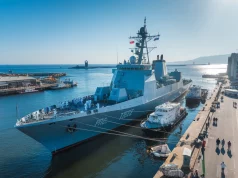Since the onset of the conflict in Ukraine, transporting and selling Russian oil has become more costly for Moscow, primarily due to Western sanctions. However, some foreign-flagged tankers operating on behalf of Russia have managed to slip through the net. London announces new sanctions.
Accessing Russian Oil Becomes More Complicated
London is ramping up its efforts against Russia by targeting its so-called “ghost fleet.” This network of oil tankers is employed to circumvent international sanctions. During the British Expeditionary Force summit, the government announced the addition of 20 ships to its sanctions list, bringing the total to over a hundred targeted vessels. This fleet, often comprising older and undeclared ships, allows Moscow to continue exporting oil despite restrictions imposed by the West.
Since the start of Western sanctions, Russia has developed a sophisticated evasion system using ships operating under dubious foreign flags. These vessels evade standard maritime controls, often lacking insurance, and continue transporting oil to destinations beyond European sanctions’ reach.
- The UK government has intensified scrutiny on these vessels.
- Collaborations have been established with Baltic Sea nations for enhanced maritime control.
To counter this strategy, several Baltic Sea bordering nations like Sweden, Poland, and Denmark are collaborating with the United Kingdom to bolster maritime controls. Authorities now systematically demand documents proving insurance for suspicious ships. Estonia alone has inspected more than 200 ships since summer 2024, a measure deemed crucial in combating this parallel maritime economy.
An Ecological Threat Raises Concerns
Beyond its financial impact, the ghost fleet poses a significant environmental threat. The Baltic Sea, a particularly fragile ecosystem, could suffer catastrophic damage in the event of an oil spill. Risks associated with the age and non-compliant operation of these vessels under international standards are prompting twelve countries to engage in increased surveillance.
- The collective initiative aims to map clandestine ship movements.
- Inspections are expanding beyond British and Estonian authorities.
This collective initiative seeks to limit dangers by mapping movements of these clandestine ships. Until now, only British and Estonian authorities conducted systematic inspections; however, this practice is expected to expand for better regulation.
Financial Aid Accompanies New Sanctions
Alongside these new sanctions, the United Kingdom announced financial aid amounting to £35 million (approximately $42 million) to support Ukraine amidst its energy infrastructure collapse. This sum includes £20 million for urgent electrical grid repairs and £15 million for essential supplies like thermal kits and generators.















